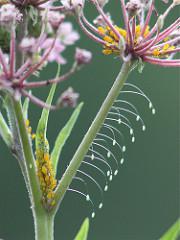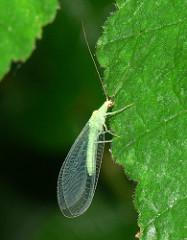by Connie Walsh, El Paso Master Gardener
Many insects are not pests since they pollinate flowers and vegetables and often feed on pests in our gardens. If you allow these beneficial insects to do their job, you can reduce the need for pesticides and improve local water quality.
There are two basic types of beneficial insects: parasites and predators. Parasites lay their eggs on or in the pest insects’ eggs or in the bodies of the pests. The larvae hatch and eat the pest. Predators work more directly. They eat the pest with powerful chewing mouth parts, or they suck them dry by using a tube-like mouth part.
Who are some of the good guys to be on the lookout for? Assassin bugs, bigeyed bugs, lacewings, lady beetles, minute pirate bugs, parasitic and predatory wasps, spiders, praying mantids, dragonflies, damselflies, and fireflies, just to name a few.
Keep these points in mind to make the best of the beneficial insects in your garden:
- Know which insects are good; learn the egg, larval, pupae, and adult stages of beneficial insects. Know the life cycle and feeding habits of these friendly garden dwellers. Recognize the signs of beneficial insects at work. Bees and wasps are pollinators and are usually only aggressive around their nests or when provoked.
- Green Lacewing Eggs on Swamp Milkweed [Note gold-colored aphids on leaves and flowers.]
- Lacewing Larva [aka Aphid Lion] with Prey
- Green Lacewing
- It takes a while for beneficial populations to build up before they can control a pest outbreak.
- If spraying is necessary, select a narrow spectrum product. Broad spectrum insecticides kill both good and bad insects. Treat only infected areas. Read the instructions on the package carefully as you don’t want to harm birds, bats, spiders, lizards or toads. Choose products that will break down quickly like soaps, oils, or pyrethrum sprays.
- Make a home for beneficial insects. Provide water in a shallow bird bath or container to which you’ve added marbles, rocks or sticks for them to stand on above the water level. Plant flowers that will provide them nectar like yarrow, anise, dill, chamomile, thyme, sage, and chives. Beneficial insects will need a place to overwinter and hide in your garden or landscape. Waiting to cut back your perennials and ornamentals until spring will provide safe places for the insects to live.
Springtime is the key time to release most beneficial insects. Keep your beneficial insects cool and watered and don’t spray them with any poisons, not even organic insecticides. Beneficial insects need lots of energy to be active and search for prey. They rely on pollen and nectar as a food source. Therefore, an important part of a successful beneficial insect gardening program is to plant and maintain a wide variety of flowering plants in your garden.
Image sources:
Green Lacewing Eggs on Swamp Milkweed by Douglas Mills (CC BY-NC-ND 2.0)
Lacewing Larva with Prey by Judy Gallagher (CC BY 2.0)
Green Lacewing by bramblejungle (CC BY-NC 2.0)

![Lacewing Larva [aka Aphid Lion] with Prey](https://txmg.org/elpaso/files/2019/03/Lacewing-Larva-aka-Aphid-Lion-with-Prey-e1553383079597.jpg)
